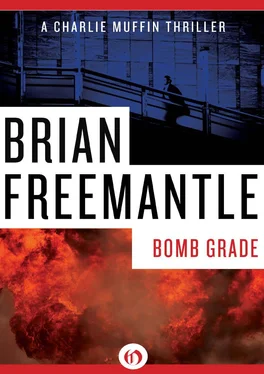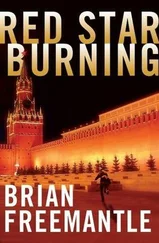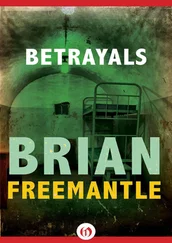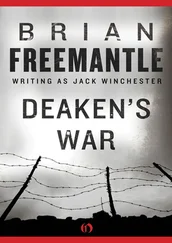Brian Freemantle - Bomb Grade
Здесь есть возможность читать онлайн «Brian Freemantle - Bomb Grade» весь текст электронной книги совершенно бесплатно (целиком полную версию без сокращений). В некоторых случаях можно слушать аудио, скачать через торрент в формате fb2 и присутствует краткое содержание. Жанр: Шпионский детектив, на английском языке. Описание произведения, (предисловие) а так же отзывы посетителей доступны на портале библиотеки ЛибКат.
- Название:Bomb Grade
- Автор:
- Жанр:
- Год:неизвестен
- ISBN:нет данных
- Рейтинг книги:4 / 5. Голосов: 1
-
Избранное:Добавить в избранное
- Отзывы:
-
Ваша оценка:
- 80
- 1
- 2
- 3
- 4
- 5
Bomb Grade: краткое содержание, описание и аннотация
Предлагаем к чтению аннотацию, описание, краткое содержание или предисловие (зависит от того, что написал сам автор книги «Bomb Grade»). Если вы не нашли необходимую информацию о книге — напишите в комментариях, мы постараемся отыскать её.
Bomb Grade — читать онлайн бесплатно полную книгу (весь текст) целиком
Ниже представлен текст книги, разбитый по страницам. Система сохранения места последней прочитанной страницы, позволяет с удобством читать онлайн бесплатно книгу «Bomb Grade», без необходимости каждый раз заново искать на чём Вы остановились. Поставьте закладку, и сможете в любой момент перейти на страницу, на которой закончили чтение.
Интервал:
Закладка:
She was still very attractive in a carefully preserved, carefully coiffeured sort of way, although the hair was beginning to stray in the heat and the crush. ‘Wise girl.’
‘Lucky,’ she said, looking around the room. ‘There’s got to be at least forty people here who’ve been told to go or moved elsewhere.’ She came back to Charlie. ‘How about you?’
‘Moving on,’ said Charlie, which wasn’t, after all, a lie.
‘Sorry, Charlie.’
Would he be? wondered Charlie. ‘It’ll work out.’
‘Charlie the Survivor,’ she declared, gin spoiling the coquettish smile. ‘That’s what they always said about you, Charlie. Even the Director-General.’
Now she decides to tell me! thought Charlie. How much more would he have learned if she had admitted him to her bed? Too late to be of any use now: the Director-General she was talking about had died at least six years ago. ‘Is that what they all said?’
She nodded. ‘That. And a lot more. How are things otherwise?‘
‘Otherwise?’ said Charlie, playing the game. It wasn’t much but it was better than sobbing into their drinks like everyone else.
‘You happy?’
‘Happy enough.’
‘With anyone?’
‘On and off.’
‘Nothing permanent then?’
‘Nothing permanent.’
‘Me neither.’
Why couldn’t it have been like this when he’d tried to know her better? ‘That won’t last, someone as pretty as you,’ he said, gallantly. She didn’t try to refasten the top button of her shirt that suddenly gave way under the strain.
‘Do you want to stay here much longer?’ she invited.
‘I wasn’t going to, anyway,’ said Charlie. ‘Got something fixed up.’ It had been a depressing mistake to come at all.
‘Oh,’ she said, crushed.
‘I’m sorry,’ apologized Charlie, still gallant. ‘I didn’t know you’d be here. Can’t cancel it now.’
‘Some other time maybe,’ she suggested, without offering a telephone number.
‘Sure,’ agreed Charlie, without asking for one.
There was another wet embrace and the insistence they keep in touch from Billy Baker and a shrill giggle from the Chinese girl and a lot of damp handshakes as he made his way out of the room and down the tilting stairs into Westminster Bridge Road. The death of the dinosaurs, he thought, breathing deeply in the darkness: or rather, their funeral. He looked sideways towards the old headquarters building, expecting it to be in darkness, but it wasn’t. It was bright with the permanent office lights of whatever ministerial department had taken it over. Gerald Williams would shit himself at the thought of the electricity bill, thought Charlie.
‘Seems you’ve covered all that’s necessary,’ encouraged the Director-General.
‘There’s a scientific and military mission in Moscow at the moment. I’ve asked them to give him the technical briefing before they leave.’
‘That’s a good idea.’
‘Williams is complaining we’ve made too many financial concessions.’
‘He’s memoed me direct, covering his back against any Treasury enquiry.’ Dean was unaccustomed to bureaucratic politics. He’d started out finding it amusing, but not any more. If half his students had behaved in the back-biting, self-serving way of virtually all the people he worked with now, he’d have suspended them from their courses until they grew up. He wished he felt more comfortable with Johnson.
The deputy Director smiled. ‘Muffin’s certainly pushed it to the very edge.’
Dean made a vague gesture over his desk, somewhere in the disorder of which Johnson presumed Charlie Muffin’s file was buried. ‘He’s always pushed everything to the edge.’
‘I can monitor that closely enough.’
‘It seems to have been difficult in the past.’
‘I wasn’t the person controlling him in the past.’
‘Are you now? I thought the committee had been established to do that?’ The other man’s arrogance was irritating.
Johnson bristled. ‘I meant on a day-to-day basis.’
‘There’s been a Director to Director note, from Fenby: he’s making a personal visit to London to meet me,’ disclosed Dean.
‘You’ll like him,’ predicted Johnson, who already knew of the visit but wanted to remind the other man of his longer experience of the department. ‘He sees the grand picture: the sort of man who knows that politics is the art of the possible.’
At the beginning of their relationship Dean had suspected Johnson’s frequent invocation of Bismarck aphorisms to be a mockery of his previous academic career but he’d learned since that the German genuinely was Johnson’s hero, which was perhaps understandable in view of Johnson’s Foreign Office association. Dean twirled his spectacles prayer-bead fashion and said, ‘I hope Muffin really understands just how much politics is involved.’
‘I can monitor that, too,’ insisted Johnson.
John Fenby thought being the Director of FBI was like being the maker of the best Swiss clock whose wheels and cogs meshed together without ever going wrong by a single second. It seemed to Fenby that virtually every FBI Director since Hoover quit or retired complaining at the impossibility of working with the President or the Congress or the Attorney General or of being the victim of staff incompetence, their only ambition from their moment of appointment to get away from Pennsylvania Avenue as fast as possible.
John Fenby didn’t want to get away from Pennsylvania Avenue. If he had his way – which he was determined always to do – Fenby was going to have to be dragged kicking and screaming from Hoover’s original seventh-floor suite from which, under two successive Presidents, he had moulded the Bureau into a personal fiefdom unmatched since the Bureau’s creator.
Fenby, who was a small, rotund man not unlike Hoover in both looks and stature, coveted the Director’s role for exactly the same reasons as its founder. He adored the Bureau jet. And the chauffeured stretch limousine. And being part of an inner circle at the White House and up on the Hill. And of personally controlling an empire of thousands spread around the globe, anxious to respond to every command he uttered. Had Fenby not been, primarily for public awareness rather than religious conviction, a twice-on-Sunday churchgoer he would have believed himself God. He contented himself with Boss, which was a Hoover word. It was, in fact, a secret regret that he couldn’t go out on arrests and be photographed with a Tommy Gun cradled in his arms, like Hoover had been. But that had been in another age. He couldn’t have everything. What he had was good enough. And what he had most of all was an awareness of how things operated in the capital of the world.
Like today.
The corner table at the Four Seasons was reserved permanently for him, whether he used it or not, the other tables moved out of hearing. Although he was the favour-purveyor, Fenby was also today’s host and therefore solicitously early, already seated when the Speaker arrived. Fenby enjoyed being included in the frisson of recognition that went through the restaurant as Milton Fitzjohn strode across the room, the political glad-hand outstretched. The required my-you’re-looking-fine-and-so-are-you recital concluded with Fitzjohn ordering bourbon. The abstemious Fenby, who never risked alcohol during working hours, already had his mineral water.
‘So how’s my boy doing, sir?’ Fitzjohn, whose iron-fist control and manipulation of Congress exceeded even that of Lyndon Johnson, occupied an original colonial mansion in South Carolina and assiduously cultivated a Southern gentleman mien to go with it. He didn’t consider anyone, certainly not any White House incumbent from whom he was only two heart beats away, his superior, but ‘sir’ was one of several insincere courtesies.
Читать дальшеИнтервал:
Закладка:
Похожие книги на «Bomb Grade»
Представляем Вашему вниманию похожие книги на «Bomb Grade» списком для выбора. Мы отобрали схожую по названию и смыслу литературу в надежде предоставить читателям больше вариантов отыскать новые, интересные, ещё непрочитанные произведения.
Обсуждение, отзывы о книге «Bomb Grade» и просто собственные мнения читателей. Оставьте ваши комментарии, напишите, что Вы думаете о произведении, его смысле или главных героях. Укажите что конкретно понравилось, а что нет, и почему Вы так считаете.












